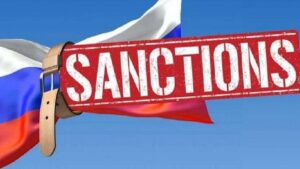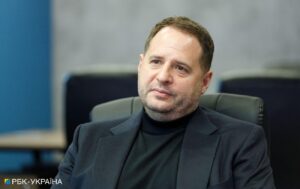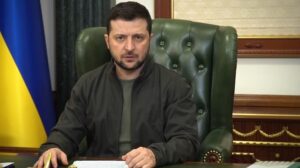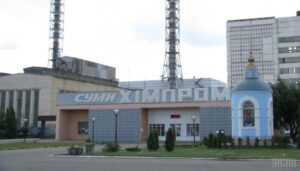
The United States may further expand sanctions against Russia, U.S. Deputy National Security Adviser for International Economics Daleep Singh said in an interview with CBS News.
“We can broaden our sanctions. So – take the measures, take the sanctions we’ve already applied, apply them in more targets. Apply them to more sectors. More banks, more sectors that we haven’t touched,” Singh said.
According to him, the sanctions may affect “the commanding heights of the Russian economy.” “It’s mostly about oil and gas, but there are other sectors too,” he said.
Speaking about the possibility of lifting sanctions against Russia, Singh stressed that “we’re nowhere near that point.”
He believes that “the first thing he has to do is to stop – a reckless and barbaric attack on the civilians of Ukraine. That’s not happening.”

Head of the President’s Office Andriy Yermak at an online meeting with representatives of the world’s leading investment companies spoke about the ongoing bombing of Ukrainian cities, the press service of the President’s Office reports.
“The whole world is talking about the terrible situation in Mariupol today. The situation in Kharkiv, in the settlements around Kyiv, is not much better. But Ukraine will never surrender, will never give up its independence. And the country’s army, which is not a member of NATO, has stopped and continues to fight against one of the largest armies in the world,” Yermak stressed.
He noted that negotiations with the Russian Federation to end the war are not easy, and it is very difficult to predict everything that the parties may eventually agree on. But for Ukraine there are definitely no compromises on its independence, sovereignty and territorial integrity.
Yermak expressed his conviction that Russia’s war against Ukraine had destroyed the structure of not only European, but also world security, and it was necessary to build a new one, where Ukraine would hold one of the key positions.
He also noted that after the end of the war, the Ukrainians will very quickly restore their country. For this, Ukraine plans to attract funds from international partners, as well as reparations that the Russian Federation must pay.
He urged businesses to invest in the purchase of war bonds of the Ukrainian government, and responsible companies that have already left or are leaving Russia to reorient themselves to Ukraine in the future. Also, according to Yermak, it would be right to consider the issue of creating special funds or individual programs for the restoration of Ukraine.
“The best response to the inhuman acts that we are now seeing on the territory of our country will be the appearance of the most modern houses and enterprises on the site of the destroyed buildings, where Ukrainians will be able to work. And we really hope that thanks to this, people who are now forced to leave Ukraine, will quickly return to their homeland,” Yermak concluded.

The European cryptocurrency exchange WhiteBIT has launched integration with the Diia public service, the company’s press service reported on Saturday.
WhiteBIT said that thanks to integration with the Diia application, now any user from Ukraine can pass KYC verification on the WhiteBIT exchange in less than one minute. Usually this procedure on all cryptocurrency exchanges requires filling out a questionnaire, scanning documents and time for verification. To pass KYC, it will be enough to select “Quick verification with the Diia app.” After that one needs to confirm the transfer of documents on the Diia app.
“In the conditions of war, cryptocurrency becomes a powerful tool for strengthening the defense capability of our country. It allows raising money for humanitarian aid, the needs of the Armed Forces of Ukraine and terrorist defense. People from all over the world want and are ready to support Ukraine through donations of their cryptoassets. We do not stand aside, but strive be the first to introduce innovations, simplify the path of users and make their interaction with WhiteBIT as comfortable as possible. After all, this, among other things, helps the Ukrainian economy, the army, people who are in trouble because of the war. We are glad that the state is becoming a convenient service and our cooperation with the Ministry of Digital Transformation confirms this. Instead of wasting time on a routine, now our clients can go through the verification procedure in just two clicks,” WhiteBIT CEO Vladimir Nosov is quoted as saying.
In addition, WhiteBIT said that the company has created a joint project with WhitePay, where everyone can choose from more than 90 cryptocurrencies and send funds to help the Ministry of Health or injured civilians, the Armed Forces of Ukraine and the territorial defense.

President of Ukraine Volodymyr Zelensky thanked American actors Ashton Kutcher and Mila Kunis, who helped raise funds to help refugees from Ukraine.
“Ashton Kutcher and Mila Kunis were among the first to respond to our grief. They have already raised $35 million and are sending it to Flexport and Airbnb to help Ukrainian refugees. Grateful for their support. Impressed by their determination. They inspire the world,” Zelensky said on Twitter.

Ukrainian President Volodymyr Zelensky has noted the efforts of the Prime Minister of Israel to find ways to peace.
The Israeli “Prime Minister, Minister [Naftali] Bennett, is trying to find a negotiating path with Russia, and we are grateful for every effort for us to start talking with Russia, sooner or later,” Zelensky said in a video address early on Monday.
“Possibly in Jerusalem. This is the right place to find peace, if this is possible,” Zelensky said.
Zelensky recalled that he spoke on Sunday in the Israeli Knesset, but, he noted, “spoke on your behalf with the people of Israel, who understand us as free people of free people.”
He said, “Israel has its interests and a strategy of protecting its citizens, we understand all that,” Zelensky said.

An ammonia leak at the chemical industry plant PJSC Sumykhimprom occurred due to shelling. One person was injured, the press service of the State Emergency Service of Ukraine has said.
“On March 21 at 03:55 in Sumy, the territory of Sumykhimprom was shelled. Due to the shelling, one tank with ammonia was damaged. As of 05:00, there was a slight leak of ammonia,” the press service wrote in the Telegram channel on Monday.
As of 7:30 am, rescuers were working to put a bandage on the damaged pipeline.